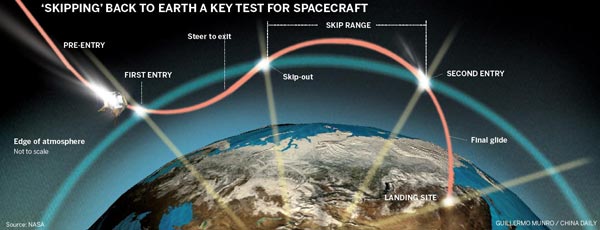Space launch to pave the way for lunar expedition
China Daily, October 23, 2014 Adjust font size:

China will launch an experimental spacecraft between Friday and Sunday to test a key technology designed to help a future lunar probe return to Earth with soil samples.
The unnamed spacecraft is due to reach a location near the moon before returning to Earth, said a spokesman for the China National Space Administration, which announced the launch on Wednesday.
It will be China's first lunar module to return to Earth, at a speed close to 11.2 km per second, space experts said.
Hu Hao, chief designer of the lunar exploration program's third phase, said in an earlier interview with China Daily that the re-entry speed could cause the return capsule to overheat or become difficult to track and control.
No simulated tests on Earth can recreate the challenge, he said.
The space agency spokesman said the re-entry will involve one or more "skips" off the Earth's atmosphere to slow the spacecraft before final re-entry. It is due to land in a central area of the Inner Mongolia autonomous region.
Experts said "skip re-entry" could help to disperse the huge amount of heat that is usually generated on faster descents.
Data from the United States' National Aeronautics and Space Administration show that "skip re-entry" technology was used on lunar missions by the former Soviet Union.
If successful, the technology will help the Chang'e-5 lunar probe to return to Earth with lunar soil samples around 2017, the spokesman said.
On Wednesday, technicians at the Xichang Satellite Launch Center in Sichuan province began fueling the Long March 3C rocket that will carry the experimental spacecraft.
Rocket expert Jiang Jie said that compared with the previous three launch missions this one poses the sternest test.
"The mission requires that the rocket sends the spacecraft to a fixed spot in space. Any inaccuracy will mean that the spacecraft will fail to enter the moon's orbit," she told China Central Television.
Liu Jianzhong, deputy chief engineer for the Long March 3 series rockets, said the mission will have a launch window of 35 minutes each day between Friday and Sunday.
The national space agency said the experimental mission marks the start of the third phase of China's lunar program featuring probes returning to Earth.
The country launched the Chang'e-1 probe in 2007, Chang'e-2 in 2010 and Chang'e-3 in 2013, completing experiments in orbiting and landing on the moon.
China has one moon rover, the Jade Rabbit, on the lunar surface. This craft, launched as part of the Chang'e-3 mission late last year, has been declared a success by Chinese authorities, although it has been plagued by mechanical troubles.

